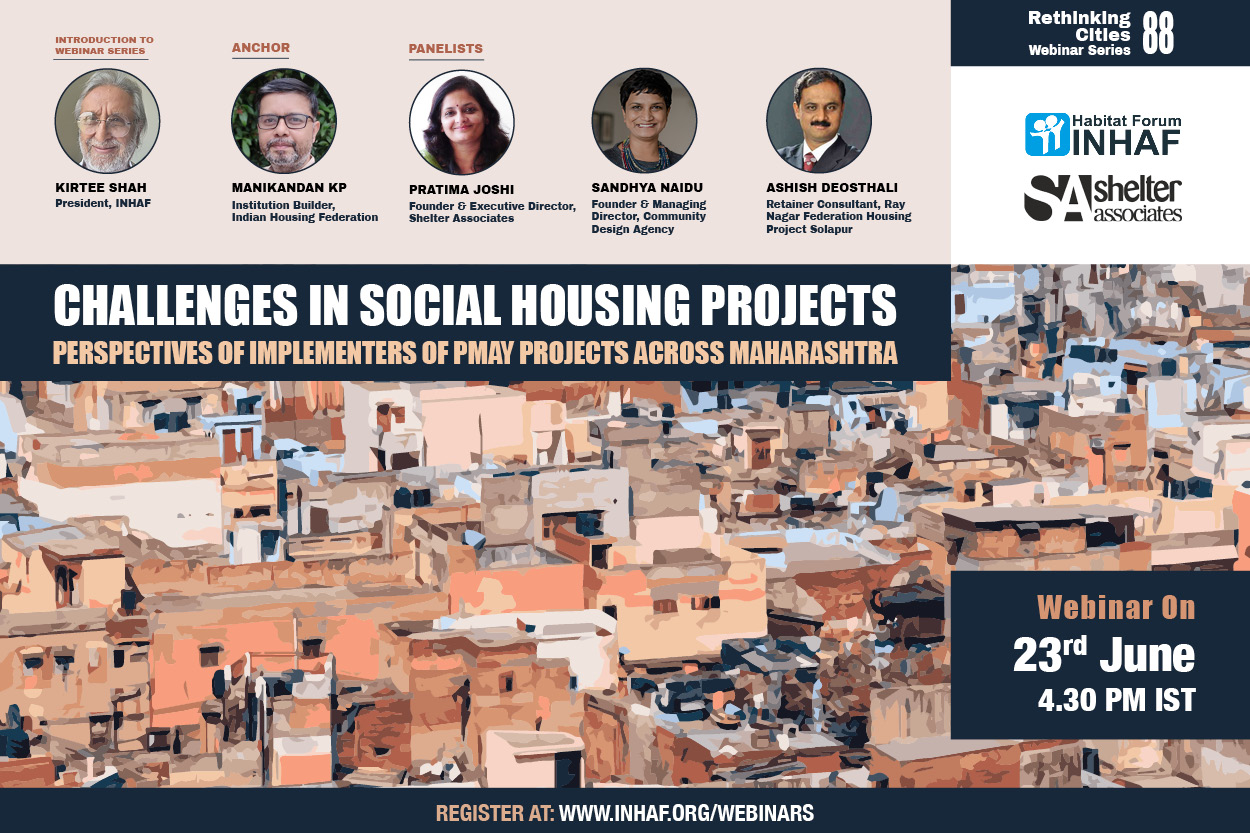
Speakers
-
 Ashish Deosthali
Ashish Deosthali -
 Manikandan KP
Manikandan KPMani is a social entrepreneur, an affordable housing expert and an evangelist for Housing For All in India, given the country’s growing need for potential housing of over 50 million dwelling units. He currently serves as the Institution builder of Indian Housing Federation (IHF), a non-profit for policy-implementation, research and advocacy. Mani is also a housing finance consultant for the World Bank and International Finance Corporation. He had contributed to World Bank Projects earlier in Bangladesh and Indonesia. He has helped establish Housing For All Mission for the Pradhan Mantri Awas Yojana, Government of Assam, India and has also consulted with the Ministry of Housing and Urban Affairs (MoHUA), Govt. of India. Mani spans the evolution of the housing finance sector in India, working on specialist roles at Equitas Housing Finance, Sundaram- BNP Paribas Home Finance, ABN Amro and ICICI Home Finance. He has administered vast geographical territories and travelled extensively in his endeavors in housing. Mani holds an M.B.A from the Thiagarajar School of Management, Madurai Kamaraj University and has studied Housing Finance at the Wharton Real Estate Center, University of Pennsylvania, Philadelphia
-
 Pratima Joshi
Pratima JoshiPratima has worked in the area of sustainable low-cost housing and sanitation for the urban poor for over 25 years. Using concepts like multi-stakeholder consultation, user-centered design and participative governance long before they were fashionable, her approach has evolved to include the following principles:
– Understanding the true situation before making plans—collect data and speak with all involved parties
– Designing spaces, whether building for the poor or toilets, must account for habits and ambitions of residents/users, rather than aiming for the lowest cost solution— this means engaging the final users rather than thrusting a well-meaning solution upon them
– Managing infrastructure is more important than building it—hence, accountability and management systems must be put in place from the start, not as after-thoughtA recipient of Aga Khan scholarship, and an expert in ‘Building Design for Developing Countries’, through her Masters-in-Architecture from London based Bartlett School of Architecture and Planning, Pratima who co-founded the NGO- Shelter Associates in 1993, has impacted over 3,70,000 people by providing safe sanitation through community and individual household sanitation. The data driven, community centric and cost sharing model, ‘One Home One Toilet’ (OHOT) has led to over 20,000 household toilets being facilitated directly in slums of Maharashtra in the cities of Pune, Kolhapur, Sangli, Navi-Mumbai, Pimpri-Chinchwad and Thane. Their social housing efforts in the cities of Pune and Sangli-Miraj has impacted over 8400 people and they continue to engage in slum rehab projects in the city of Kolhapur.
In December 2009, Google Earth recognized her efficient use of Google Earth technology towards poverty mapping, and thus acknowledged her as ‘Google Earth Hero’, which made her the only Indian to receive ‘Google Earth Hero Award’ and she has also been identified by BBC as a leading ‘Slum architect of India’.
In the last 6 years, she has won many awards including, LPC Honour Award at the UN
Convention 2020, ‘NASSCOM Social Innovation Forum 2017’, award, recognized as a Social Entrepreneur by Ashoka Fellowship, India Sanitation Coalition- FICCI’s special recognition for innovative use of data for delivery of sanitation, ‘Amazing Indian’ by Times Now and the HUDCO award for sanitation solutions jointly with the Pune municipal corporation, to name
a few.Pratima speaks and presents her work extensively across the world at universities, to governments and other social sector organizations, including policy discussions and advisory role in government programs such as the Rajiv Awas Yojna (RAY). She has been a vocal advocate of OHOT model on various national and international platforms.
-
 Sandhya Naidu Janardhan
Sandhya Naidu Janardhan
Local Time
- Timezone: America/New_York
- Date: Jun 23 2023
- Time: 7:00 am - 8:30 am
Challenges in Social Housing: Perspectives of implementers of PMAY projects across Maharashtra
Pradhan Mantri Awaas Yojana – Urban (PMAY – U) is one of the most popular schemes through which the government provides affordable housing to the urban poor. But riddled with challenges like administrative delays, incorrect land records and ambiguous guidelines, how will the Government achieve its target of completing 2 crore houses under the scheme by December 2024?
While the implementers facilitating affordable housing projects under PMAY -U cite a lack of clear guidelines as the biggest impediment, the underserved communities are also hesitant to avail subsidy under the scheme due to inordinate delays in approvals and lack of access to credit.
It is evident that there is a need for more synergy between the administrative bodies, the implementers and the communities. Only then through collaborative efforts of all stakeholders can new strategies emerge.
To begin with, both central and state Governments need to be galvanised into identifying impediments at the implementation level, simplifying processes, publishing clear guidelines and cleaning land records.
This discussion will be centred around the perspectives of implementers of three unique PMAY projects in Maharashtra which vary in scale and approach. This will provide valuable insights into the practical challenges faced by them and their strategies for addressing these issues.
Considering that at least 50% of India will reside in cities by 2050, it is imperative that PMAY-U becomes a success so that building a pucca house for the eligible does not remain an unattainable goal for the Government and an unfulfilled dream of the underserved communities.
